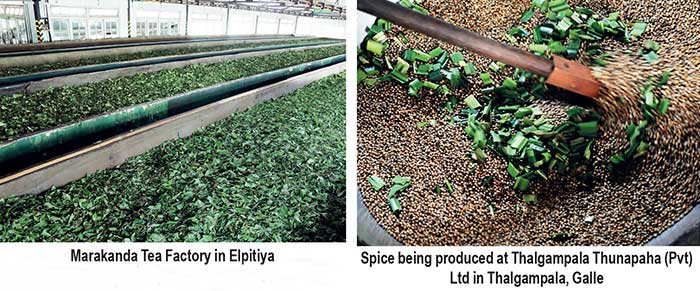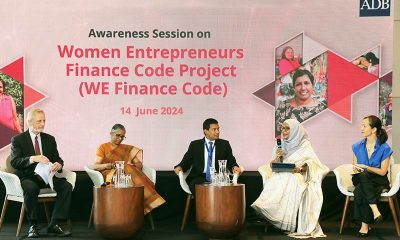Business
ADB loans serve as big push for SMEs in the hinterland of Sri Lanka

Timely funds rekindle the spirit of entrepreneurship
by Sanath Nanayakkare
As a multilateral bank the Asian Development Bank (ADB) has supported the SME sector in the country for a long time with many lending products and capacity building assistance. The Island Financial Review recently had the opportunity to meet with beneficiaries of five SME projects recently supported by the ADB in areas of the southern province far away from the cities. It was clear that ADB’s timely funds were quintessentially empowering the spirit of entrepreneurship in the hinterland.
These five beneficiary SMEs were from Karandeniya, Ambalangoda, Habaraduwa, Elpitiya and Thalgampala. They are actively and full-time engaged in different businesses, namely; cinnamon quilling and processing, coir product manufacturing and exporting, Ayurveda product manufacturing and exporting, spice production/sales and Orthodox black tea manufacturing. There were two successful women entrepreneurs among them who had built profitable businesses while creating a significant number of jobs for the youth in their areas. The following is a brief account of each of the SMEs served by ADB funds.
Pradeep Premaratne in Karandeniya operates a small yet successful cinnamon quilling and processing facility at his house with the support of his wife. The Regional Development Bank (RDB) one of the 13 participating banks to whom ADB funds are routed through the Ministry of Finance, had given a LKR 1.5 million loan to Pradeep as a working capital facility. It was a collateral free loan at an interest of 11.5%. Pradeep and his wife who earlier made cinnamon sticks from 100 kilos of raw cinnamon trees today employ 5 – 7 workers and process 300-500 kilos of raw tree per day and supplies about 850 kilos of finished sticks to the market for export on a monthly basis. He said that his monthly earnings had increased by about four fold as a result of the ADB working capital loan.
M.C De Zoysa, Managing Director- M.C Enterprises in Idantota, Ambalangoda received an ADB loan of LKR 10 million through Seylan Bank for his coir product manufacturing and exporting business. He received the loan during the covid pandemic period and he described the loan as a great ‘prop up’ at the time. “During the pandemic, people in many countries started growing their own food and the demand for coco peat for garden plants saw a phenomenal increase. ADB working capital loan I received enabled me to expand my production and meet the increased demand. The profits I made were re-invested for purchasing new machinery. If not for the ADB loan, I wouldn’t have been able to take advantage from that situation.”
He exports 30- 50 containers of coconut and coir-based products per month to South Korea, the Middle East, U.S.A. and China. The factory provides 75 direct jobs and more than 3000 indirect jobs. Zoysa is planning to expand his factory space and install a transformer while exploring solar power solutions for his operations.
Woman entrepreneur Supuli Karunaratne, managing director at Nature Healing Ayur (Pvt) Ltd in Habaraduwa received a loan of LKR 4 million and a grant of LKR 1 million under ADB’s Women Entrepreneurs Finance Initiative to expand her business in herbal food supplements manufacturing and exporting. Today she owns a new capsule filling machine with the capacity to fill 3,000 capsules in one hour which has significantly reduced her manual workforce. She exports health supplement products to countries such as Switzerland, Lithuania, Japan, and the Maldives.
Woman entrepreneur Chandanie Samanthi, director at Thalgampala Thunapaha (Pvt) Ltd received an ADB loan of LKR 3 million as a working loan facility through Nations Trust Bank. “My company with the support of my husband and staff achieved 30% growth this year compared to Year 2021 and I expect significant growth in the next 12 months. I am planning to expand our outlets network to Colombo and Jaffna in the coming years. Now we produce about 3,000 kilos of spice per day and sell just about the same volume while having a surplus stock at any given time. We are striving to attract higher customer appeal for the brand each year and we will position Thalgampala Thunapaha as the best Sri Lankan spice brand by 2029.”
Anura de Siva, chairman/managing director at Marakanda Tea Factory in Elpitiya of Evergreen Group received an ADB loan of LKR 10 million through DFCC Bank in Galle as a working capital facility.
Evergreen Group Accountant Danuka Dassanayake said,” The total loan amount we obtained from DFCC was LKR 35 million. Out of that we obtained refinance of Rs. 10 million from ADB at an interest rate of 4.75%. The total funds were used for building our CTC factory and purchase CTC machinery. The ADB loan share reduced our interest cost significantly making a positive impact on our finances and making our journey easier.”
Senal de Silva, director of the Group said that there are 13 factories in the Group and they contribute 4% of the total national tea export volume. “We acquired Marakanda at a time it had been closed down. We have been able to turn it around to a better position but it is still the weakest in the Group. However, it remains resilient thanks to the strength of the Group. Marakanda faces the issue of procurement of good tea leaf from the area. Other than that everything is stable. Tea smallholders do not care about the fact that harvesting methodology has a huge impact on the quality of the tea and its grading as per export-market benchmarks. I think that the government has a role to play in creating awareness among them and to educate them on the right balance between quality and quantity when providing their yield to factories for processing. There is fierce competition among the tea factories to procure tea leaf, therefore, tea smallholders are tempted to cut corners because they can supply anything to the factories. This should be corrected through the intervention of the authorities,” he said.
Marakanda tea factory employs 70 workers on a daily basis while the Group employs a total of 1,500 workforce.
SME Line of Credit Project of the ADB has three tranches which provide USD 340 million of assistance to the SME sector commencing from 2016. The first disbursement of USD 100 million and the second disbursement of USD 75 million through additional financing have already been utilized. The third disbursement through another additional financing of USD 165 million is currently being utilized by the participating banks to provide further access to finance SMEs.
Business
HNB Assurance delivers industry leading 42% revenue (GWP) growth and 28% rise in profits (PAT)

HNB Assurance PLC reported an outstanding financial performance for the year ended 31st December 2025, delivering a 42% year-on-year growth in Life Insurance Gross Written Premium (GWP), this along with the growth rate in Renewals are the highest in the industry.
Life GWP reached Rs. 19.49 Bn compared to Rs. 13.71 Bn in 2024, reflecting strong New Business generation and Renewal Collection. Net Written Premium grew even faster at 43% to Rs. 18.44 Bn, highlighting the quality and sustainability of the Company’s topline expansion.
Commenting on the results, Chairman Stuart Chapman stated, “The year under review was marked by gradual macroeconomic stabilisation, improved investor sentiment and a more predictable policy environment. Although the economy continues to recover from prior volatility, we are beginning to see renewed financial confidence among individuals and businesses. Against this backdrop, HNB Assurance has delivered strong growth in both revenue and profits, while maintaining robust capital adequacy and prudent risk management. Our improvement in top line, profitability and balance sheet strength demonstrates the resilience of our business model and our ability to navigate changing economic conditions which are reflected in an ROE which increased to 18.5% from 16.9% a year earlier.”
Profit Before Tax increased by 28% to Rs. 3.03 Bn from Rs. 2.36 Bn in the previous year, while Profit After Tax (including Life Surplus Transfer) rose by 28% to Rs. 2.12 Bn compared to Rs. 1.66 Bn in 2024. Earnings Per Share improved by 28% to Rs. 14.15 from Rs. 11.04, reinforcing the Company’s ability to consistently translate business growth into enhanced shareholder value. In line with this strong performance, the Board of Directors has proposed a first and final dividend of Rs. 5.00 per share for 2025, representing a 28% increase over the Rs. 3.90 per share declared in the previous year.
Executive Director and Chief Executive Officer Lasitha Wimalaratne highlighted the consistency of the Company’s upward trajectory. “Our 2025 performance reflects a sustained pattern of high growth and disciplined execution over the past four years. During this period, we have consistently strengthened our distribution reach, enhanced advisor productivity, invested in digital enablement and sharpened our customer centric value proposition. Each year we have built on the previous year’s gains, and the 42% growth in Life GWP in 2025 is the strongest affirmation yet of that strategy. Importantly, we have achieved this while maintaining underwriting discipline, expanding our Life Fund and delivering a 28% increase in PAT.”
The strength of the Company’s balance sheet continued to improve during the year. Total Assets grew by 28% to Rs. 68.44 Bn from Rs. 53.40 Bn, while financial investments increased by 29% to Rs. 62.49 Bn from Rs. 48.49 Bn in 2024, reflecting disciplined asset accumulation and prudent investment management. Total Equity rose to Rs. 12.19 Bn from Rs. 10.81 Bn, supported by Retained Earnings which grew by 18% to Rs. 10.23 Bn.
The Life Insurance Fund recorded a significant expansion of 27%, increasing to Rs. 48.87 Bn from Rs. 38.34 Bn in the previous year. During the year, the Company paid Rs. 4.40 Bn in Net Insurance Benefits and Claims, honouring its commitments to policyholders and their families while further strengthening long term reserves. Investment Income remained a key contributor to performance, with interest and dividend income rising by 10% to Rs. 7.49 Bn.
The Market Capitalisation as at the end of the year stood at Rs. 17.21 Bn up 43% from a year ago when it was Rs. 12.02 Bn, while trading for year ended at Rs. 114.75 per share increasing by 43% from Rs. 81.10 a year ago.
Business
Phoenix Ogilvy Dominates Sri Lanka’s Creative Rankings

Standout year with international award show wins at LIA, One Asia, Clio, AdFest, Spikes Asia & The Work
Phoenix Ogilvy has been named 2025 Sri Lanka Agency of the Year after topping The Campaign Brief Asia’s Creative Rankings as the most internationally awarded agency in the country, an agency news release said..
The agency’s ranking also marks Sri Lanka’s return to the list in 2025, following the country’s absence from it the previous year.
The Campaign Brief Asia Creative Rankings annually evaluate the top 100 most awarded creative agencies in Asia, based on their achievements across leading international award shows.
The rankings are widely regarded as one of Asia’s most credible measures of creative excellence. Agencies accumulate points purely from award wins across major international creative shows, making it one of the longest-running and most respected benchmarks of creative performance in the region.
Phoenix Ogilvy secured the top spot in the national table, amassing an impressive 295 Creative Ranking points after standout wins across six major international creative award shows, including London International Awards (LIA), One Asia Awards, Clio Awards, AdFest, Spikes Asia, and Campaign Brief’s The Work.
Being ranked at the top not only signals national creative leadership for Phoenix Ogilvy but also exhibits the agency’s talent strength. In a testament to this creative calibre, the agency’s talent dominated the Campaign Brief Asia’s Individual Creative Rankings in Sri Lanka.
Leading this list is Nadeera Warawita with 250 Creative Ranking points, followed by Sakuna Ranasinghe at No. 2 with 220 points, and Samitha Kaushalya at No. 3 with 150 points. Meanwhile ranked jointly at No. 4, are Dilshi Aberaja, Dilshard Ahamed, Harsha Kumara, Kasun Wadumestri, Keshan Silva, and Suresh Kumar. At no. 10 is Dilshi Thathsarani.
Speaking on these achievements, Irvin Weerackody, Chairman of the Ogilvy Group Sri Lanka, said, “Creativity has always been our lifeblood, and it is encouraging to see that commitment recognised on the world stage. The real test of an agency is not the trophies, but the courage to create with integrity, especially today. These achievements not only reflect the capability of our talent, but importantly their discipline, their cultural instinct and their refusal to take the easy way out. I am proud of our teams, who continue to push themselves year after year to raise the bar and uphold the standards we believe in.”
For five decades, Phoenix Ogilvy has been a defining pillar of the country’s marketing landscape and an influential creative powerhouse. From its earliest days, the agency has challenged convention and advocated brave thinking, producing work that commands attention, both locally and internationally.
Renowned as a formidable training ground for Sri Lankan advertising talent, the agency has also played a pivotal role in shaping generations of trailblazing creatives, strategic thinkers, and industry leaders who continue to leave their mark across the region and beyond.
Strengthened by the global Ogilvy network, the agency enjoys a rare blend of global creative rigour and deep local intelligence. Over the years, it has diversified across multiple disciplines and today stands as a talent hub for 290 industry specialists spanning creative, strategy, digital, media, public relations and integrated communications in Sri Lanka.
At its core, the agency remains true to the principles it was built on: that great ideas come from disciplined minds, uncompromising craft, and the refusal to settle for the ordinary.
Business
Oak Ray Chef Marks a Culinary Milestone with 118 Unique Creations

In the intricate world of pastry and bakery arts, R.S. Weerakoon has emerged as a visionary creator, known for his extraordinary ability to transform any concept into a stunning cake masterpiece. Currently serving as the Head Chef (Pastry & Bakery) at the Oak Ray Group in Kandy, Weerakoon’s journey is a blend of local talent and international expertise.
An alumnus of Udispattuwa Maha Vidyalaya, Weerakoon holds an NVQ Level 04 qualification from NAITA and is a distinguished member of the Chefs’ Guild of Sri Lanka. With over 14 years of experience in the industry, including valuable tenures in Kuwait and Oman, he has successfully integrated Middle Eastern culinary trends with local flavors.
One of his most significant contributions to the industry is the introduction of 118 unique products to the Oak Ray Group. Remarkably, all these creations are made without the use of any artificial food colorings, prioritizing the health and well-being of consumers.
Speaking about this talented professional, the Chairman of the Oak Ray Group, Mr. Sujeewa Palliyaguruge, stated that his vision is to provide a creative platform for such skilled young individuals.
“Our goal is to allow talented creators like Weerakoon the freedom to innovate and bring their unique visions to life, which ultimately benefits the entire culinary industry in Sri Lanka,” he said.
Weerakoon’s dedication to natural ingredients and his mastery of cake architecture continue to set new benchmarks for the next generation of chefs in the hill capital.
- R.S. Weerakoon
By S.K. Samaranayake
Pix by Razik Jabbar
-

 Features7 days ago
Features7 days agoLOVEABLE BUT LETHAL: When four-legged stars remind us of a silent killer
-

 Business7 days ago
Business7 days agoBathiya & Santhush make a strategic bet on Colombo
-

 Business7 days ago
Business7 days agoSeeing is believing – the silent scale behind SriLankan’s ground operation
-

 Features7 days ago
Features7 days agoProtection of Occupants Bill: Good, Bad and Ugly
-

 News6 days ago
News6 days agoPrime Minister Attends the 40th Anniversary of the Sri Lanka Nippon Educational and Cultural Centre
-

 News7 days ago
News7 days agoCoal ash surge at N’cholai power plant raises fresh environmental concerns
-

 Opinion3 days ago
Opinion3 days agoJamming and re-setting the world: What is the role of Donald Trump?
-

 Business7 days ago
Business7 days agoHuawei unveils Top 10 Smart PV & ESS Trends for 2026


























